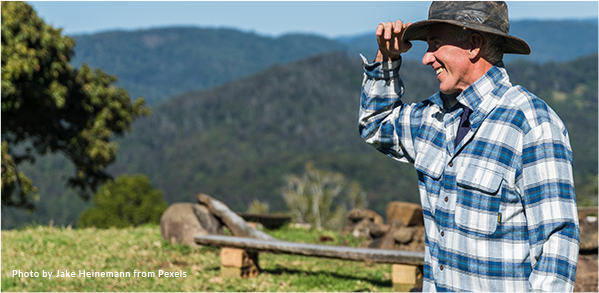Their soft, cuddle-a-little-longer style is enough reason to make organic cotton bedding, bath, and home items some of your favorite all-time purchases. But opting to go organic offers more benefits than you might think. Our series on reasons to buy organic continues here, this time with a look at how selecting products like ours is about smarter choices when it comes to health—not only for you and your family, but for the men and women growing organic cotton…and for the planet that supports us all.
BETTER FOR: THE EARTH
Simply put, the methods and materials used to grow organic cotton create less of an impact on the environment than those used to farm conventional cotton. Certified organic cotton is produced naturally, minus the use of GMOs and harmful chemicals like artificial pesticides and synthetic fertilizers. This not only keeps toxins from entering our waterways via agricultural run-off, but it also protects the long-term fertility of the soil, which can become contaminated and depleted of nutrients from exposure to pesticides and fertilizers.
Organic cotton items like ours also come with OEKO-TEX® certification, ensuring the use of low-impact dyes in the making of our sheets, pillows, towels, robes, and more. In addition to being non-toxic, these dyes require less water and rinsing during the manufacturing process. Choosing a safer dying method is also another way to help protect waterways: It prevents the dumping of conventional dyes and other processing chemicals like formaldehyde, heavy metals, and bleaches into our rivers and groundwater.

BETTER FOR: THE FARMERS
Farming cotton organically leads to a healthier workplace for the people physically tending to the land. When farmers no longer apply harmful pesticides or handle unsafe fertilizers, it lowers their personal risk for the health effects and chemical-related illnesses these substances pose. (Studies link conventional fertilizers and pesticides to everything from risk of skin irritation and allergic reactions to a risk of developing conditions such as cancer, neurological and respiratory issues, effects on the endocrine system, and more.)
Likewise, the communities in which these organic farmers work and live can benefit. There is less of a chance for toxins from a farm’s water runoff to reach their water supply and contaminate the drinking water. There is no spray drift from airplanes spraying fertilizers or pesticides over nearby fields. Plus the area’s fish and wildlife remain safer—and their habitats stay protected.

BETTER FOR: YOU & YOUR FAMILY
Choosing organic cotton products with OEKO-TEX® certification for your home is an easy way to lessen your family’s exposure to pesticides and toxins—and is a smart option for people with sensitive skin, chemical sensitivities, or allergies, as harsh chemicals used in conventional bedding can irritate to the skin. This is especially true if you have a little one: Since babies have thinner skin, they tend to be more vulnerable to irritation and inflammation.
Best of all? The absence of all those chemicals, toxic dyes, and bleaches ensures that organic cotton produces a comfortable, more breathable material. This means items like our bedding don’t trap heat that leaves you feeling too hot or sweaty while you’re trying to sleep…making organic cotton a good idea for anyone who simply needs a good night’s rest. Because better sleep is vital for physical health and mental health—and always, always creates a better day.

Sources/For Further Reading:
U.S. National Library of Medicine
https://toxtown.nlm.nih.gov/sources-of-exposure/agriculture#reduce-your-risk
“Effects of Chemical Fertilizers and Pesticides on Human Health and Environment: A Review,”
Nayana Sharma and Ritu Singhvi, International Journal of Agriculture, Environment and Biotechnology, December 2017
“Chemical Pesticides and Human Health: The Urgent Need for a New Concept in Agriculture,”
Polyxeni Nicolopoulou-Stamati, Sotirios Maipas, Chrysanthi Kotampasi, Panagiotis Stamatis, and Luc Hens, Front Public Health, 2016; 4: 148. https://www.ncbi.nlm.nih.gov/pmc/articles/PMC4947579/
Occupational Health & Safety Magazine
https://ohsonline.com/articles/2017/12/07/the-hidden-dangers-of-chemical-fertilizers.aspx
OEKO-TEX
https://www.oeko-tex.com “Change in skin properties over the first 10 years of life: a cross-sectional study,” Fanqi Kong, Carlos Galzote, and Yuanyuan Duan, Archives of Dermatological Research, 2017; 309(8): 653–658. https://www.ncbi.nlm.nih.gov/pmc/articles/PMC5606948/
SHOP CONSCIOUSLY WITH UNDER THE CANOPY
